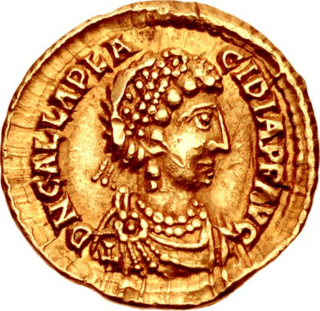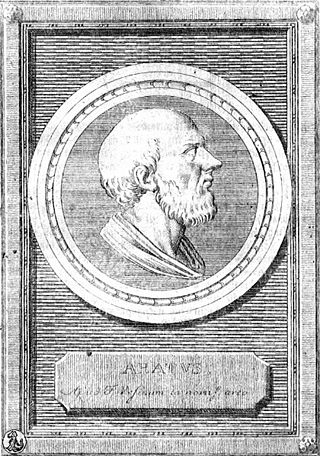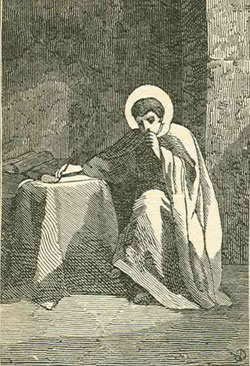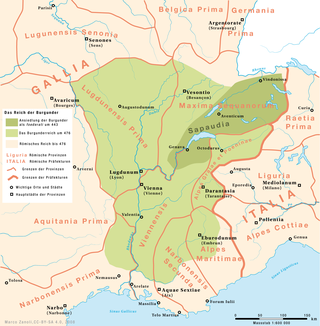Related Research Articles

Galla Placidia, daughter of the Roman emperor Theodosius I, was a mother, tutor, and advisor to emperor Valentinian III. She was queen consort to Ataulf, king of the Visigoths from 414 until his death in 415, briefly empress consort to Constantius III in 421, and managed the government administration as a regent during the early reign of Valentinian III until her death.
Flavius Aetius was a Roman general and statesman of the closing period of the Western Roman Empire. He was a military commander and the most influential man in the Empire for two decades (433–454). He managed policy in regard to the attacks of barbarian federates settled throughout the West. Notably, he mustered a large Roman and allied (foederati) army in the Battle of the Catalaunian Plains, ending a devastating invasion of Gaul by Attila in 451, though the Hun and his subjugated allies still managed to invade Italy the following year, an incursion best remembered for the ruthless Sack of Aquileia and the intercession of Pope Leo I.

Aratus was a Greek didactic poet. His major extant work is his hexameter poem Phenomena, the first half of which is a verse setting of a lost work of the same name by Eudoxus of Cnidus. It describes the constellations and other celestial phenomena. The second half is called the Diosemeia, and is chiefly about weather lore. Although Aratus was somewhat ignorant of Greek astronomy, his poem was very popular in the Greek and Roman world, as is proven by the large number of commentaries and Latin translations, some of which survive.
Claudius Claudianus, known in English as Claudian, was a Latin poet associated with the court of the Roman emperor Honorius at Mediolanum (Milan), and particularly with the general Stilicho. His work, written almost entirely in hexameters or elegiac couplets, falls into three main categories: poems for Honorius, poems for Stilicho, and mythological epic.

Theocritus was a Greek poet from Sicily, Magna Graecia, and the creator of Ancient Greek pastoral poetry.

PubliusVegetius Renatus, known as Vegetius, was a writer of the Later Roman Empire. Nothing is known of his life or station beyond what is contained in his two surviving works: Epitoma rei militaris, and the lesser-known Digesta Artis Mulomedicinae, a guide to veterinary medicine. He identifies himself in the opening of his work Epitoma rei militaris as a Christian.

Girolamo Fracastoro was an Italian physician, poet, and scholar in mathematics, geography and astronomy. Fracastoro subscribed to the philosophy of atomism, and rejected appeals to hidden causes in scientific investigation. His studies of the mode of syphilis transmission are an early example of epidemiology.

Barthold Georg Niebuhr was a Danish–German statesman, banker, and historian who became Germany's leading historian of Ancient Rome and a founding father of modern scholarly historiography. By 1810 Niebuhr was inspiring German patriotism in students at the University of Berlin by his analysis of Roman economy and government. Niebuhr was a leader of the Romantic era and symbol of German national spirit that emerged after the defeat at Jena. But he was also deeply rooted in the classical spirit of the Age of Enlightenment in his intellectual presuppositions, his use of philologic analysis, and his emphasis on both general and particular phenomena in history.

Prosper of Aquitaine, also called Prosper Tiro, was a Christian writer and disciple of Augustine of Hippo, and the first continuator of Jerome's Universal Chronicle.

The Greek Anthology is a collection of poems, mostly epigrams, that span the Classical and Byzantine periods of Greek literature. Most of the material of the Greek Anthology comes from two manuscripts, the Palatine Anthology of the 10th century and the Anthology of Planudes of the 14th century.

Marcus Verrius Flaccus was a Roman grammarian and teacher who flourished under Augustus and Tiberius.
Rutilius Claudius Namatianus was a Roman Imperial poet, best known for his Latin poem, De reditu suo, in elegiac metre, describing a coastal voyage from Rome to Gaul in 417. The poem was in two books; the exordium of the first and the greater part of the second have been lost. What remains consists of about seven hundred lines.
Magnus Felix Ennodius was Bishop of Pavia in 514, and a Latin rhetorician and poet.
Marcus Aurelius Nemesianus was a Roman poet thought to have been a native of Carthage and flourished about AD 283. He was a popular poet at the court of the Roman emperor Carus.

Flavius Cresconius Corippus was a late Roman epic poet of the 6th century, who flourished under East Roman Emperors Justinian I and Justin II. His major works are the epic poem Iohannis, a panegyric called "Panegyric of Anastasius", and a poem in praise of the Emperor Justin II, In laudem Iustini minoris. Corippus was probably the last important Latin author of Late Antiquity.
George of Pisidia was a Byzantine poet, born in Pisidia. As an important early poet of Byzantine literature, his work "contributed a great deal to the formation of many of the main features of Byzantine poetry".
Gaudentius was the son of Flavius Aetius. F. M. Clover has argued that his mother was Pelagia, a Gothic noblewoman and the widow of Bonifacius.
Flavius Mallius Theodorus was a Roman politician and author of an extant treatise on metres, De metris, one of the best of its kind. He also studied philosophy, astronomy and geometry, and wrote works on those subjects, which, together with his consulship, formed the subject of a panegyric by Claudian.

The Kingdom of the Burgundians or First Kingdom of Burgundy was established by Germanic Burgundians in the Rhineland and then in eastern Gaul in the 5th century.
Croceae or Krokeai was a village of ancient Laconia on the road from Sparta to Gythium, and near the latter place. It was celebrated for its marble quarries. Pausanias describes the marble as difficult to work, but when wrought forming beautiful decorations for temples, baths, and fountains. There was a marble statue of Zeus Croceates before the village, and at the quarries bronze statues of the Dioscuri. The most celebrated of the Corinthian baths was adorned with marble from the quarries at Croceae. A number of blocks of green Laconian porphyry from the quarries at Croceae have been found in the Minoan palace at Knossos.
References
- This article incorporates text from a publication now in the public domain : Chisholm, Hugh, ed. (1911). "Merobaudes, Flavius". Encyclopædia Britannica . Vol. 18 (11th ed.). Cambridge University Press. p. 172.